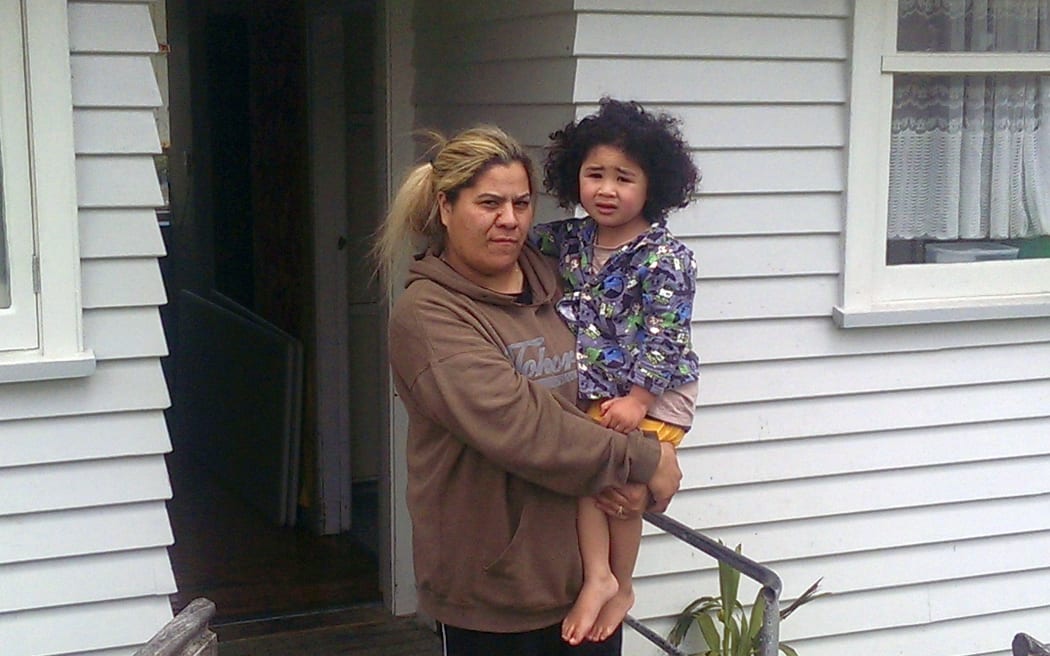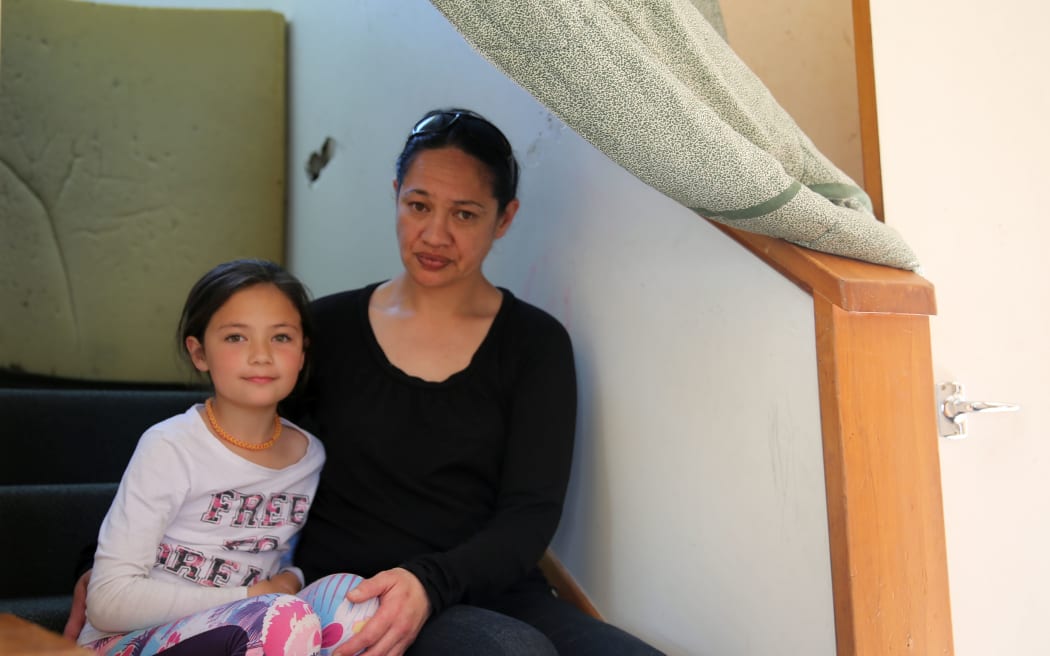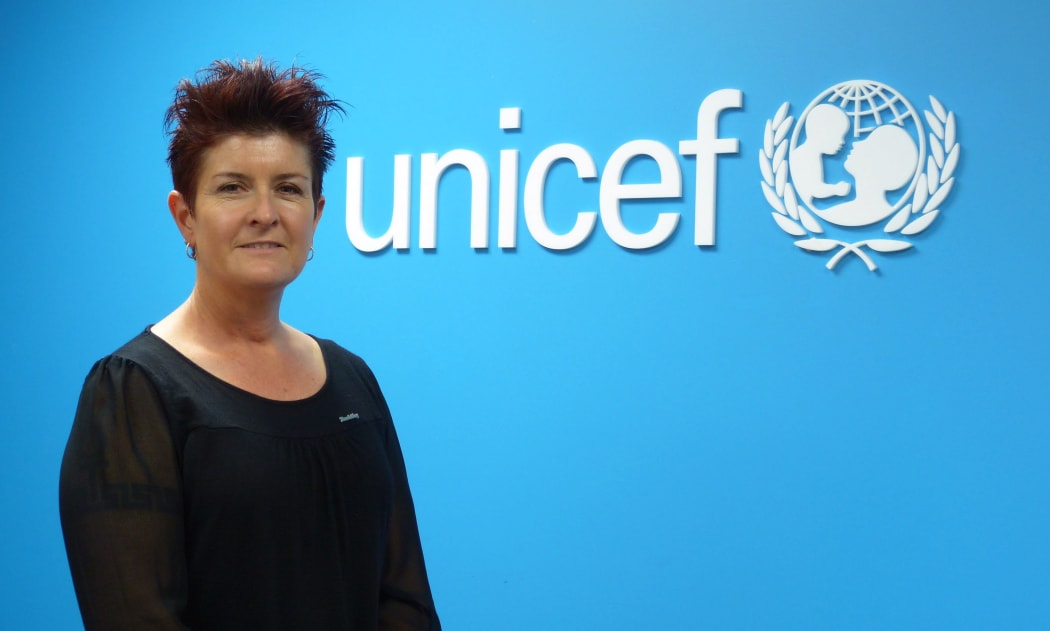In a small kitchen, just big enough to fit a table and chairs pushed up against the wall and a cupboard with a microwave on top, Elsie talks about her struggle to keep the house warm, and the illnesses her family suffers because of the cold.
The windows are open airing the house, despite the cold wind, and there are curtains provided by the Sustainability Trust, which helps families with health issues caused, or made worse by, their homes.

Elsie and her three-year-old son Erasmus at home in Cannons Creek Photo: ( RNZ / Philippa Tolley )
Listen to Insight - What More Can be Done for Children?
"I have two children with asthma, and two children with eczema and plus a few of my children are suffering from respiratory problems and the doctors picked that up at the school.
"They asked where they sleep and gave me some advice to keep the rooms warm so now I share one of the heaters around just to warm the rooms up a bit," she says.
The five-bedroom Waitangirua house is a Housing New Zealand property and in it, Elsie cares for her partner, who suffers from diabetes and severe psoriasis, six of their children and a nephew.
"My daughter who has asthma has it real bad and it affects her schooling, she's hardly been to school and it's been like that since she attended pre-school right up to now and she is at intermediate."
Is New Zealand letting its children down?
The problems facing Elsie's family are not uncommon among those struggling to make ends meet and that is why more than 20 years after signing up to the UN Convention on the Rights of the Child, New Zealand is being accused of letting its children down.
Unicef has just launched a campaign, Make My Future Fair, to highlight the plight of the many children who are failing to thrive. The most commonly-used figures indicate New Zealand has 260,000 children living in poverty.
The 2014 Child Poverty Technical Report says on average 40,000 children are admitted to hospital every year with illnesses associated with their socio-economic situation - mostly respiratory illnesses and skin infections.
The same report says 127 children, between the ages of zero and 14, died of medical conditions or accidents somehow associated with their living conditions or family life.
Too cold to take her shoes off to sleep
Back at Elsie's house, her badly asthmatic daughter sits on the sofa, under a duvet, watching TV. She is quiet and subdued and talks about how she can't go to school in case her breathing gets worse.
Across the city to the west in Titahi Bay another teenager is sitting quietly, flicking through his tablet with none of the bounce seen in most 15-year-old boys. He too is badly asthmatic. His mother, Polly, says he was kicked out of school because he missed too many classes because of hospital admissions and time spent at home unwell.

Polly and daughter, Tegan, in their home in Titahi Bay. They take the mattress behind them into the living room at night and drop the duvet pinned across the stairs to keep the warmth in. Photo: ( RNZ / Philippa Tolley )
Polly also lives in a Housing New Zealand home, and she too believes the cold is making her children ill. Despite a bright day outside, she keeps the curtains pulled to give the family some privacy from the road and the neighbours.
The house has a fire place, but Polly doesn't keep it lit: the wood is too expensive. Instead she relies on a single oil heater. At night, the family move foam mattresses from the stairs into the living room and Polly sleeps "marae style", as she puts it, alongside her 15-year-old son and seven-year-old daughter.
She says some nights it's so cold that she's scared to take her shoes off and instead goes to bed with them on.
"Since we've moved into this house we had bronchial problems, respiratory problems, very severe and quite worrying actually. I feel if we did move it would make a big impact on their health."
'We've got a significant issue that we've got to be prepared to address'
Under the UN Convention on the Rights of the Child signed up to in 1993, New Zealand has an obligation to ensure that all children have a standard of living that is good enough to meet their physical and mental needs. They should also have access to services such as education and healthcare and be helped to grow up in a happy environment.
Unicef National Advocacy Manager Deborah Morris-Travers wants change to break a cycle she says is incredibly costly to New Zealand, both socially and financially, and she hopes the charity's new campaign will help put pressure on the government as planning for next year's budget gets underway.

National Advocacy Manager Deborah Morris Travers Photo: ( RNZ / Philippa Tolley )
In 2010, the government cut taxes by about $1 billion per annum and Unicef and other agencies believe an investment of about a $1bn in needed in our children.
"We are continuing at the moment to create a cycle of disadvantage that is enormously costly, costing the nation about $10b a year, but also socially and morally it is unjust. So whichever why you look at it either economically or through a social justice lens we've got a significant issue that we've got to be prepared to address," says Ms Morris-Travers.
Insight asked Minister for Social Development Anne Tolley for a response to accusations the government is not living up to its obligations under the UN convention. Her office replied that she was not available and had nothing further to add to the regular submission to the UN already written by the ministry.

